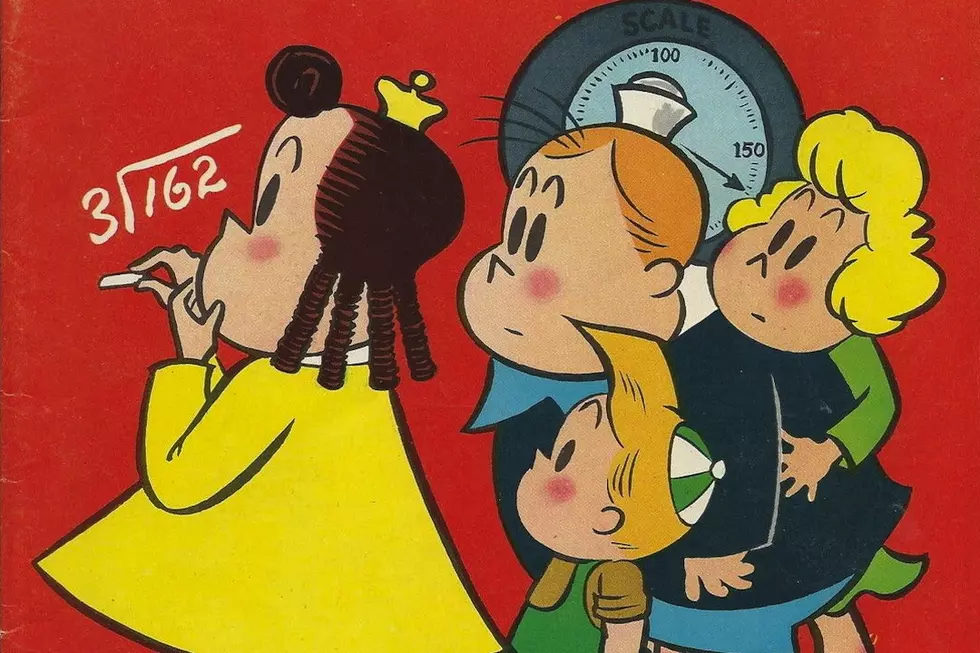
Now Girls Allowed: Celebrating the Impact of Little Lulu
Little Lulu is a truly iconic figure in the world of cartoons. At her peak in the 1950s, she towered over Times Square, broke down gender stereotypes, and was read by millions in comic books and newspapers around the country --- a massive level of success that was achieved through the dedication and vision of her creator, a woman who navigated the treacherous waters of the publishing business and kept full control over her signature character.
Little Lulu first appeared in the Saturday Evening Post, starring in a single-panel cartoon in the issue cover-dated February 23, 1935. Carl Anderson's Henry comic had been one of the magazine's most popular features for the previous two years, but after Anderson took his character to launch a newspaper strip with William Heart's King Features Syndicate, the Post needed to fill the space, so they tapped cartoonist Marjorie Henderson Buell to come up with a replacement.
Buell (who was known professionally simply as 'Marge') came up with Little Lulu, and initially stuck closely to Anderson's template --- in her earliest appearances Lulu is little more than Henry with curls and a dress; a gangly and mute agent of childish chaos...
But Buell soon settled in and developed her own distinct style; Little Lulu began to build in popularity, and the title character took on her familiar form. The legs shortened (and/or the dress lengthened), the lines became more fluid, the simple pantomime slapstick evolved into something unique.
By the early '40s, Little Lulu was everywhere. Buell had wisely maintained all ownership and control over her feature, had a keen mind for business and marketing, and with the aid of a lawyer and agent, quickly expanded beyond the world of magazine comics.
Lulu's likeness appeared on toys; Paramount released a series of theatrical cartoon shorts; collections of the Post strips appeared in bookstores; and starting in 1943, the International Cellucotton Company contracted to use Little Lulu in an extensive ad campaign for Kleenex tissues --- a partnership that would eventually put Lulu on primetime TV, feature her on an elaborate billboard in New York's Times Square, and place her face in countless publications.
Lulu made her last appearance in the Post in 1944. The next year, she starred in her first comic book, Dell's Four Color #74, and began appearing in her own ongoing series in January 1948. In 1950, the Chicago Tribune Syndicate launched a Little Lulu newspaper strip.
By that time, Buell herself had stepped back from most of her day-to-day creative duties, continuing to provide the art for all Kleenex print ads, but taking on other creators to handle the rest of the Lulu line.
By most estimations, it was in the late '40s and '50s, under writer/artist John Stanley, that Little Lulu hit her peak. Stanley spent fourteen years scripting (and sometimes drawing) the main Little Lulu comic, as well as various specials and spin-off titles, and over that time, he expanded the cast, solidified the essential personalities and dynamics, and built the series into a true classic of the medium. His stories melded an innate understanding of child-like reason with a finely-tuned sense of the ridiculous, letting his characters' personalities drive the series in new directions.
Stanley took Marge's "Joe" and turned him into "Tubby", Lulu's comedic foil and ringleader of the neighborhood boys. He also developed Lulu herself into a canny, caring, and often cranky individual, no longer the simple mischief-minded imp of the early comics, but a character with a deep dedication to her friends and a unique sense of internal logic. This Lulu could go from frustrated to amused and back again in the space of a single panel, and balanced generosity and grumpiness in the way that only a kid can.
Stanley also moved beyond the stock-standard tropes of us-versus-them kids' entertainment, taking familiar situations and demonstrating their inherent absurdity. Lulu always stood up for her little neighbor Alvin, young and annoying though he might be. She always fought for the underdog. Her response to being told by Tubby and the boys that "girls weren't allowed" wasn't ever to retreat, or to look for a loophole --- instead, she'd join forces with her fellow girls to do their own, better things.
Lulu didn't just beat the boys at their own game, she created her own game. And inevitably, the boys would either end up needing her help, or notice that her game looked better and ask to join in.
Little Lulu continued to enjoy great popularity for decades. She still appeared in campaigns for Kleenex through the early '60s, and also in promotions for other companies and products. The syndicated Little Lulu newspaper strip ran until 1969, and Western Publishing's comic book was published regularly until the company suspended their entire line in 1985.
A pair of Little Lulu cartoons (based on Stanley stories) were produced by Paramount/Famous Studios in the early '60s; an anime series entitled Little Lulu And Her Little Friends aired for a season in the US and Japan in 1976-77; there were a pair of half-hour live-action Little Lulu specials aired in 1978 as part of ABC's Weekend Special series; and HBO produced a Little Lulu animated series from 1995-1999.
Marjorie Buell herself maintained full control over her creation until 1971, when she sold the rights to Western and retired. She participated in a retrospective exhibition of her work in Oberlin, Ohio in 1982, and then, aside from giving select interviews, stayed mostly out of the spotlight up until her death in 1993. John Stanley's comic stories have become rightly revered and seen reprints in many different forms --- first in box sets from Another Rainbow in the '80s and '90s, and most recently in a comprehensive series of volumes from Dark Horse.
On the day of the anniversary of the first appearance of the ageless, irrepressible Little Lulu, it's worth taking a moment to note the impact she's had on comics and culture.
More From ComicsAlliance









